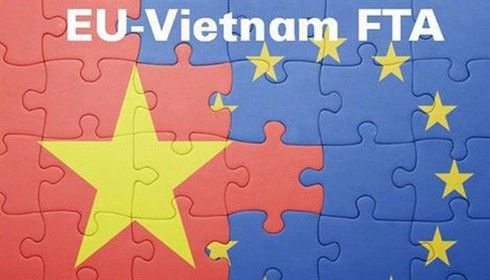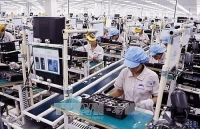
New FTAs put pressure on VN to reform business practices
Latest
| TIN LIÊN QUAN | |
| Business seminar to promote Vietnam – Ghana trade | |
| Deputy PM addresses Vietnam Business Summit 2019 | |
 |
| Experts say the EVFTA will have a significant impact on Vietnam's economy in the years to come. (Photo: vneconomy.vn) |
The Comprehensive and Progressive Agreement for Trans-Pacific Partnership (CPTPP) and the EU-Vietnam FTA (EVFTA) trade deals will have a significant impact on the economy, according to Pham Binh An, director of the HCM City International Integration Support Centre.
The CPTPP and EVFTA could help increase Vietnam’s GDP by 4.3 percent and 1.3 percent, respectively, by 2030, he said.
Shipments to the EU are expected to surge by about 44 percent by 2030, while those to CPTPP-member states are expected to rise by 14.3 percent by 2035, according to An.
Moreover, the two trade agreements will put pressure on the Government to improve institutional governance as well as the business climate because of requirements included in the FTAs.
As of last year, Vietnam had 17 FTAs with 60 countries, all of which offer the country a chance to transform its economy.
Besides increasing exports, FTAs have helped to promote administrative reform, improve infrastructure, and ensure equality in accessing resources.
Ngo Thanh Phong, lecturer at Tien Giang University, said that FTAs had created opportunities to participate in global supply chains, but Vietnam must speed up administrative reform and improve its investment environment, especially in the context of increased protectionism internationally.
Between 2021 and 2025, the country’s gross domestic product (GDP) is forecast to rise to 7 percent on the back of new-generation FTAs, according to the Ministry of Planning and Investment’s National Centre for Socio-Economic Information and Forecast.
Vu Tien Loc, chairman of the Vietnam Chamber of Commerce and Industry (VCCI), said that Vietnam’s economic openness was ranked behind Singapore among ASEAN members, but its competitiveness and capacity for integration were still low.
In the 2018 Global Competitiveness Report by the World Economic Forum, Vietnam ranked 77th out of 140 countries. It placed 99th for institutional competitiveness and 101st in business competitiveness.
Experts noted that Vietnamese products have advantages in certain markets such as the EU, which has little direct competition with Vietnam. However, to make the most of their position, local businesses must meet the EVFTA’s requirements on environmental standards, labour relations, product origin, and sustainable development.
At the conference, 20 out of 50 scientific papers received from 22 universities nationwide were chosen by the conference’s Scientific Council to be published in the 2019 yearbook of the HCM City Banking University.
The event, organised by the university in cooperation with the HCM City Youth Science and Technology Development Centre, offered researchers, economic experts and scholars a chance to exchange views on how new-generation FTAs will affect Vietnam’s economy.
 | Government works to improve business climate A number of business conditions have been reduced or removed thanks to the Government’s efforts in improving the business environment and increasing national competitiveness. |
 | National oil group’s six-month business tops plan The Vietnam Oil and Gas Group (PVN) has announced it generated a total revenue of 365.5 trillion VND (15.8 billion USD) in the first half ... |
 | Seminar discusses Vietnam-India business opportunities Vietnam and India can cooperate in areas of strength such as agriculture, textiles, footwear, renewable energy, and pharmaceuticals, according to the Ministry of Industry and ... |

























